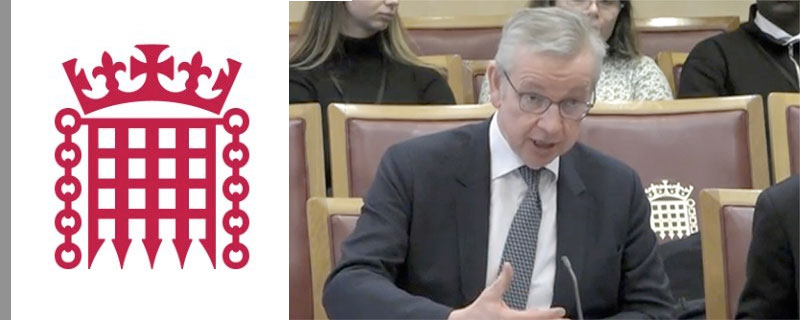Gove wants to change the perspective of planners
Housing secretary Michael Gove has told the House of Lords Built Environment Committee that his department will shine a ‘more pitiless light on local authority performance’ – while accepting that the work of public sector planners is too often underappreciated.
Gove made this remark during a section of the proceedings on planning resources, in which he also expressed his desire to see the expertise of local planners appreciated.
Baroness Janke highlighted RTPI research that found that 80 per cent of local planning departments do not currently have the staff to meet their workload demands.
She questioned what the Department for Levelling Up, Housing and Communities (DLUHC) is doing to evaluate the impact of additional funding and also what plans there are to help the recruitment and retention of planners, “many of whom have moved to the private sector where salaries are significantly higher?”.
Gove listed government measures including an increase in the amount being made available to local authorities “specifically for enhancing the planning department through the planning delivery grant”, which he described as “one of the most oversubscribed funds that we’ve dedicated”.
He also mentioned the increase in planning fees.
“We’ve also made it clear that statutory consultees and others have to have their fee arrangements changed in order to put money into the system. How will we monitor it? We’re going to have, not just league tables showing how well local authorities are doing – and they already exist in a way in how the Housing Delivery Test is met – but we’ll have more honest league tables. We’ll be shining a more pitiless light on local authority performance in order to see which of them are performing well.”
Gove added that he was committed to changing the perception of planners, telling the committee that he had heard from people within the profession that they feel it “has been denigrated” and is “underappreciated”.
“I think it is sometimes the case in some local authorities that the expertise of planners is not always appreciated, and I want to change that.”
In answer to Lady Janke’s question about whether the comprehensive resources and skills strategy promised in the 2020 Planning for the Future white paper will be produced and be adequately resourced, Gove emphasised that planning had been prioritised for additional support.
“We have been working with the RTPI and others to ensure we have an approach towards skills and education in this area that will encourage more people into the profession and enhance the delivery of a pipeline of skilled planners overall. And yes, there is more that can be done.”
When pressed on the skills strategy, Gove replied: “We will come back to this committee with such an outlook.”
Nutrient neutrality rules ‘inflexible’
On nutrient neutrality, Lord Best questioned whether primary legislation was still part of the plan to address it rather than continue with a moratorium on housebuilding.
Gove noted that the government had sought to introduce an amendment in the autumn of 2023 to what was at the time the levelling up and regeneration bill, which the Lords rejected . Although keen to bring forward primary legislation, there wasn’t space in the “congested” King’s Speech last November, he said.
“That doesn’t mean that we have been idle,” said Gove. “We’ve been working in order to ensure that we can provide more extensive mitigation, both to ensure that a market of mitigation can become more mature and also to use public money to help that as well.”
Lord Best brought up a Home Builders Federation (HBF) figure of 140,000 homes not being built as a result of current nutrient neutrality rules. He questioned whether this was broadly right or “an exaggeration, as some people have told us”.
“It is difficult to be precise,” answered Gove. “We use the figure of around 100,000. Because again, with no disrespect to the HBF, we thought it better to be cautious in that estimate. The work they have done reflects the direct experience of their members; there is no reason to believe it is anything other than robust, but we wanted to err on the side of caution.”
Nutrient neutrality issues are affecting 74 local authorities. Nutrient pollution is an urgent problem for freshwater habitats and estuaries that are home to wetland birds, fish, and insects. Increased levels of nitrogen and phosphorus, for example, can speed the growth of certain plants, which disrupts natural processes and damages wildlife.
In 2018, ‘Dutch N’ came before the European Court of Justice, which ruled that articles 6(2) and 6(3) of the EU Habitats Directive, as implemented in the UK by the Conservation of Habitats and Species Regulations 2017, should require that new development affecting Special Protection Areas (SPAs) and Special Areas of Conservation (SACs) achieve nutrient neutrality.
Natural England responded by revising guidance for local authorities on how to conduct an appropriate assessment of all housing applications to guard against nutrient-related problems. Developers are expected to mitigate or offset pollution.
Source: The Planner







Leave a Reply
Want to join the discussion?Feel free to contribute!